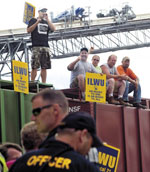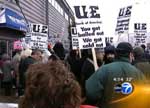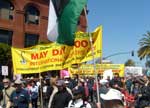
Showdown on West Coast Docks: The Battle of Longview
(November 2011).
click on photo for article

Chicago Plant Occupation Electrifies Labor
(December 2008).
click on photo for article

May Day Strike Against the War Shuts
Down
U.S. West Coast Ports
(May 2008)
click on photo for article

June 2014
Obama’s Back-to-Work Order Is a Trap
SEPTA Workers:
Strike Together to Win!

Striking engineers and electrical workers of the SEPTA mass transit system in Philadelphia on June 14, before President Obama ordered them back to work. Democrats are no friends of labor. (Photo: Joseph Kaczmarek/AP)
PHILADELPHIA – Just past midnight on Saturday, June 14, over 400 unionized Southeastern Pennsylvania Transportation Authority (SEPTA) workers represented by the International Brotherhood of Electrical Workers Local 98 (IBEW) and the Brotherhood of Locomotive Engineers and Trainmen Division 71 (BLET) walked off their jobs. This marked the breakdown of four years of fruitless contract negotiations with the SEPTA administration.
The Phildelphia Inquirer headlined, “SEPTA Rail Struck, 13 Lines Shut Down.” The Daily News put it, “Guess We’re Walking.” The strike would affect over 60,000 passengers in and around Philly. But within a matter of hours, the Democratic administration of Barack Obama issued an executive order forcing the strikers back to work and barring IBEW and BLET from striking for 240 days.
Obama’s back-to-work order was a body blow to SEPTA unions. Yet it was hailed by the leadership of the BLET and the IBEW. The union bureaucrats had repeatedly called for increased government intervention in negotiations with SEPTA. IBEW president Terry Gallagher told the press that the executive order was “what we were waiting for. We have been five years without an agreement, trying to get to this point, and we’re happy we’re here now.”
The unions called for retro pay raises and increased contributions to the underfunded pensions in line with those SEPTA offered Transport Workers Union Local 234 (TWU) after a 2009 strike. Representing subway and bus operators and comprising over half of all 10,000 SEPTA workers, the TWU possesses the most bargaining power out of the 17 SEPTA workers’ unions.
SEPTA wants to stick TWU workers with a 1% pay cut to pay for the Obamacare tax on union health plans. It essentially provoked the BLET/IBEW strike by announcing it would impose a contract containing no back pay and no increase in pension contributions.
A joint statement by the BLET and IBEW tops in May laid out their “strategy” of appealing for binding arbitration, saying that the unions had been “patient for over four years” of negotiations. In a June 10 letter to union membership announcing the strike, BLET said SEPTA “is afraid of a formal investigation of this dispute by an unbiased tribunal – such as an Arbitration Board or a Presidential Emergency Board.”
“Patience” with the bosses and increased government intervention are the opposite of what workers need, and an arbitration board or presidential emergency board (such as Obama has now ordered) are hardly “unbiased.” Calling for arbitration will win nothing. What is needed to gain real advancements in workers’ rights is unrelenting class struggle, which begins by recognizing that the capitalist state represents the class enemy.
The history of SEPTA unions’ relations with management is an object lesson in how bureaucratized union leadership acts against the interests of labor and in favor of capital. The fact that SEPTA workers are divided into 17 different unions is a major obstacle, which the bosses use to set one craft or group of workers against another.
Back in March, TWU Local 234 president Willie Brown and other leaders were talking tough, saying “If negotiations fail, the unions representing SEPTA workers may all be on strike at the same time, idling bus, trolley, train and Regional Rail service for the first time ever.” But as a walkout loomed, Brown told the Inquirer (11 June) that a BLET/IBEW strike “wouldn’t affect us.” And on June 14, TWU members were ordered to stay on the job, undermining the strike.
This wasn’t the first time the TWU leadership stabbed other SEPTA unions in the back. In 1983, Conrail passed its suburban railway lines to SEPTA, which pushed to eliminate 600 union jobs and decrease pay of new hires. The unions agreed to strike together until all unions had settled. But the TWU, which wasn’t affected, refused to go out with the others.
After a strike lasting 108 days, SEPTA enacted all of the changes it originally proposed. It would have been a different story had the largest SEPTA union hit the picket lines with the others in solidarity.
Today, the labor-hating press theatrically sighed relief, and union leaders welcomed the handcuffs placed on them by the federal government on June 14. But nothing has been resolved. Commuter rail and city transit workers are still without contracts, facing concessionary demands on wages, health care and retirement benefits.
SEPTA workers have enormous power in their hands, but they are stymied by a leadership that divides the workers and looks to the bosses’ government rather than the power of workers solidarity. To overcome this, Philly mass transit workers should elect a joint strike committee and prepare for industrial-strength action against SEPTA and the federal straightjacket. This would be a giant step toward uniting into one powerful industrial union.
Almost three quarters of a century ago, Leon Trotsky pointed out: “There is one common feature in the . . . degeneration, of modern trade union organizations . . . it is their drawing closely to and growing together with the state power” (“Trade Unions in the Epoch of Imperialist Decay” [1940]). Trotsky warned that unions would either be instruments of the revolutionary struggle of the working class, or be secondary instruments of capital for the disciplining of labor.
Today’s sellout misleaders of labor are firmly committed to the latter course. The answer is not to junk the unions but to drive out the bureaucrats who endanger the unions by acting as agents of the bosses and their state. Above all, what’s needed is to build a leadership that will break with the Democrats and defy the bosses and their state, a leadership committed to the program of class struggle rather than class collaboration. ■